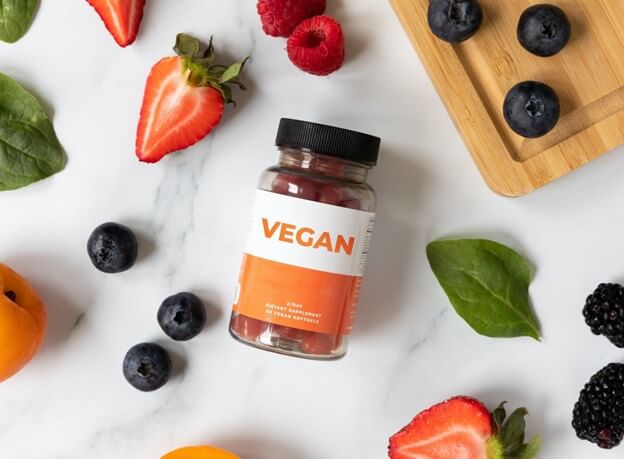Essential Nutrients for Plant-Based Eaters
Plant-based eating has become a popular diet and lifestyle choice for a growing number of people. Some people choose the lifestyle to limit their environmental impact and reduce animal cruelty, while others become vegan to improve their overall health and wellness. One of the main problems that vegans face is nutrient deficiency. In addition to protein, meat and animal-derived food also contains many essential vitamins and minerals that aren’t as readily found in plant-based sources. Taking the right supplements is important for vegans looking for a long-term lifestyle change. Below, I’ll show you some of the key nutrient deficiencies that vegans need to be aware of and why they may need to supplement!
Where Do Vegans Get Their Vitamins & Minerals?
When most people think of plant-based eating, they tend to think of large plates full of veggies, fruit, beans, and other plant-based proteins. It certainly sounds healthy enough, right? All of these natural plant-based foods are healthy and packed with essential vitamins and minerals. The only problem is that it’s hard to get all of the essentials from a purely vegan diet. Unfortunately, many vegans become deficient in certain vitamins or minerals shortly after starting their new diet. In fact, this is one of the main reasons why many vegans aren’t able to keep up with their diet for the long-term. Not all vegans eat a healthy diet, either. There are lots of heavily processed foods that technically qualify as “vegan,” even if they’re not at all healthy. These low-quality vegan foods often have little to no nutritional value, which can be detrimental to your health, if you’re not balancing them out with natural plant-based foods. In addition to eating healthy plant-based foods, most serious vegans also take natural vitamin and mineral supplements. These supplements help to “fill-in” the missing nutrients that you’re not getting from meat and animal-derived foods.
Common Vegan Nutritional Deficiencies
Fruits, veggies, and legumes are a great source of natural vitamins and minerals. However, they don’t give your body everything it needs to stay healthy. Here are some of the most common nutritional deficiencies faced by vegans and plant-based eaters.
1) Essential Minerals
Minerals such as zinc or iron are essential to our health. Iron, especially, is one of the key components needed to produce red blood cells. Having low iron often results in a condition called anemia, which can cause fatigue, weakness, and make you more injury-prone. Vegans and vegetarians are almost twice as likely to be anemic, compared to meat-eaters. This is because meat (particularly red meat) is one of the biggest sources of iron in the human diet. Iron is present in small amounts in various vegetables. For instance, these healthy vegan alkaline meals are all great sources of natural minerals. However, they rarely contain enough to provide everything that our bodies need. So, one of the first supplements that vegans should look into are those that contain essential minerals.
2) Trace Minerals
In addition to “essential minerals,” such as calcium, iron, and zinc, our bodies also need trace minerals. Our bodies need less of these trace minerals, compared to the essential minerals. However, they’re still just as vital to our overall health. Trace minerals like selenium, manganese, chromium, iodine, and others all support healthy organ function, brain health, and can prevent disease.
3) Vitamin B12
Vitamin B12 is an essential vitamin that our bodies need to build red blood cells and healthy DNA strands. It also supports a healthy metabolism as well as our natural energy levels. Unfortunately, the biggest sources of vitamin B12 are meat and eggs. To prevent deficiency, vegans should find a healthy plant-based vitamin B12 supplement that doesn’t come from animal sources.
4) Vitamin D
Vitamin D is another vitamin that’s most commonly found in meat and animal-derived foods. Many of the vitamin D supplements on store shelves are non-vegan and come from animal sources. In addition to B12, I recommend that all vegans find a healthy plant-based vitamin D supplement.
Who Should Take Plant-Based Supplements?
Anybody who plans on starting a plant-based diet should include vegan-friendly vitamin and mineral supplements into their daily routine. These will provide your body with the essential nutrients that it’s not getting from meat, and will reduce the likelihood of nutrient deficiency! Individual needs may differ, depending on your age, health conditions, and other factors. I recommend speaking with a plant-based nutritionist or your doctor to help you come up with a long-term supplementation plan.
Conclusion – Supplements Are Key To a Healthy Vegan Lifestyle
Taking the right plant-based supplements is important to any vegan diet. Keeping your vitamin and mineral levels high will ensure that you don’t suffer from deficiency and will help you stay consistent with your new lifestyle.






